
The pictures that came out of Houston and other areas that were hard hit by Hurricane Harvey were pretty awful. There were numerous photographs of people with young children and pets wading through high water in the hope of being rescued by boat or helicopter. There was also the picture of elderly people in a nursing home sitting in waist-high water waiting to be rescued. It was a pretty horrible story.
Because the United States is a wealthy country, we do have large numbers of boats and helicopters and trained rescue workers able to assist the victims of the storm. We also have places where we can take these people where they will have shelter, as well access to food and medical care. However bad the human toll will be from Harvey, it would be hugely worse without these resources.
In this context, we may want to take a moment to think about Bangladesh, a densely populated country on the other side of the world. More than 160 million people live in Bangladesh. Almost half of these people live in low-lying areas with an elevation of less than 10 meters (33 feet) above sea level.
Bangladesh experiences seasonal monsoon rains which invariably lead to flooding, as well as occasional cyclones. The monsoon rains and cyclones are likely to be more severe in future years as one of the effects of global warming. This will mean that the flooding will be worse.
Bangladesh does not have large amounts of resources to assist the people whose homes are flooded. It does not have the same number of boats and helicopters and trained rescue workers to save people trapped by rising water. Nor can it guarantee that people who do escape will have access to adequate shelter, medical care or even clean drinking water. This means many more people are likely to be dying from floods in Bangladesh as a result of the impact of global warming.
Ironically, as Houston and Texas were still being hit by Harvey last week, a building collapsed in Mumbai, India, likely the result of the pressure from this year’s monsoon rains and the resulting floods. Nineteen people were reported dead from the collapse, with another 30 having been rescued after being trapped in the rubble.
So far this summer, more than 1,000 people across South Asia have died as a result of flooding from the monsoons. We are likely to see many more incidents like this building collapse, as well as more people drowning in floods due to the effects of global warming.
In the US, the debate over global warming is often treated as one between those who like government intervention and those who support a free market. This is nonsense.
Allowing people to emit greenhouse gases without paying for the damage done is like allowing them to dump their sewage on their neighbor’s lawn. No one seriously argues that it is a “free market” principle that they get to dump their sewage on their neighbor’s lawn. Everyone understands that we are responsible for dealing with our own sewage and not imposing a cost on our neighbors.
It’s the same story with the greenhouse gases that cause global warming, even if the chain of causation may be somewhat more complicated. At this point, we have pretty clear evidence that the planet is warming, with the predictable bad effects like rising oceans and more severe storms. We also know that greenhouse gas emissions are the main cause.
For this reason, the dumping of sewage analogy is appropriate. The United States and other wealthy countries are imposing enormous costs, including the loss of large numbers of lives, through our emissions of greenhouse gases.
It is understandable that a rich jerk like Donald Trump might not want to pay for the damage he does to the world, especially when the people most affected are dark-skinned, but it is not a serious position. It has nothing to do with market philosophy; it is just a story of not accepting responsibility.
The emissions from the United States and other wealthy countries will result in a lot of Harvey-like disasters in Bangladesh and elsewhere in the developing world. We should be moving quickly to try to limit the harm. We should also be giving these countries the assistance they need to deal with the disasters that we have caused them. This isn’t a question of charity, it’s a question of whether we think we can get away with ruining the lives of the world’s poorest just because we are rich and powerful.
Our most important fundraising appeal of the year
December is the most critical time of year for Truthout, because our nonprofit news is funded almost entirely by individual donations from readers like you. So before you navigate away, we ask that you take just a second to support Truthout with a tax-deductible donation.
This year is a little different. We are up against a far-reaching, wide-scale attack on press freedom coming from the Trump administration. 2025 was a year of frightening censorship, news industry corporate consolidation, and worsening financial conditions for progressive nonprofits across the board.
We can only resist Trump’s agenda by cultivating a strong base of support. The right-wing mediasphere is funded comfortably by billionaire owners and venture capitalist philanthropists. At Truthout, we have you.
We’ve set an ambitious target for our year-end campaign — a goal of $180,000 to keep up our fight against authoritarianism in 2026. Please take a meaningful action in this fight: make a one-time or monthly donation to Truthout before December 31. If you have the means, please dig deep.